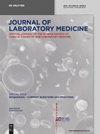Standardization with zlog values improves exploratory data analysis and machine learning for laboratory data
IF 1.8
4区 医学
Q4 MEDICAL LABORATORY TECHNOLOGY
引用次数: 0
Abstract
Objectives In the context of exploratory data analysis and machine learning, standardization of laboratory results is an important pre-processing step. Variable proportions of pathological results in routine datasets lead to changes of the mean (使用 zlog 值进行标准化可改进实验室数据的探索性数据分析和机器学习
目的 在探索性数据分析和机器学习中,实验室结果的标准化是一个重要的预处理步骤。常规数据集中病理结果比例的变化会导致平均值(µ)和标准偏差(σ)的变化,从而给经典的 z-score 转换带来问题。因此,本研究探讨了 zlog 转换是否能弥补这些缺点,并从医学角度使结果更有意义。方法 本文所展示的结果是通过 R 统计软件环境获得的,基础数据集来自加州大学欧文分校机器学习资料库。我们比较了五种不同降维方法、分层聚类和四种监督分类方法的 zlog 和 z-score 转换的差异。结果 在本研究中,对于降维、聚类和分类方法,使用 zlog 变换比使用 z-score 变换获得了更好的结果。通过弥补 z-score 变换的缺点,zlog 变换可以得出更有意义的医学结论。结论 我们建议在应用探索性数据分析和机器学习技术时,使用 zlog 转换对实验室结果进行预处理。
本文章由计算机程序翻译,如有差异,请以英文原文为准。
求助全文
约1分钟内获得全文
求助全文
来源期刊

Journal of Laboratory Medicine
Mathematics-Discrete Mathematics and Combinatorics
CiteScore
2.50
自引率
0.00%
发文量
39
审稿时长
10 weeks
期刊介绍:
The Journal of Laboratory Medicine (JLM) is a bi-monthly published journal that reports on the latest developments in laboratory medicine. Particular focus is placed on the diagnostic aspects of the clinical laboratory, although technical, regulatory, and educational topics are equally covered. The Journal specializes in the publication of high-standard, competent and timely review articles on clinical, methodological and pathogenic aspects of modern laboratory diagnostics. These reviews are critically reviewed by expert reviewers and JLM’s Associate Editors who are specialists in the various subdisciplines of laboratory medicine. In addition, JLM publishes original research articles, case reports, point/counterpoint articles and letters to the editor, all of which are peer reviewed by at least two experts in the field.
 求助内容:
求助内容: 应助结果提醒方式:
应助结果提醒方式:


